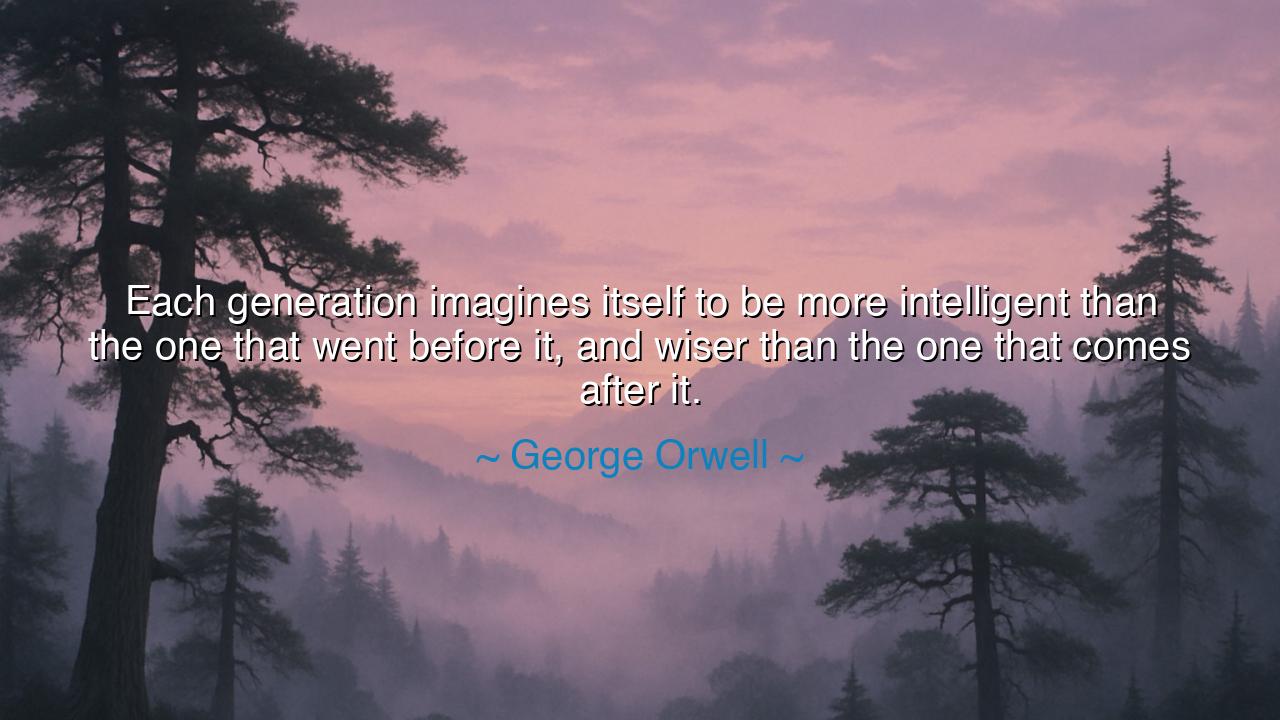
Each generation imagines itself to be more intelligent than the
Each generation imagines itself to be more intelligent than the one that went before it, and wiser than the one that comes after it.






"Each generation imagines itself to be more intelligent than the one that went before it, and wiser than the one that comes after it." Thus spoke George Orwell, the great chronicler of truth and delusion, whose words echo like a warning bell across the ages. In this saying, Orwell exposes the timeless pride of humankind—the belief that we, the living, stand at the pinnacle of understanding, superior to both our ancestors and our descendants. Each age, he tells us, looks backward with scorn and forward with suspicion, seeing itself as the final keeper of wisdom. Yet this pride is an illusion, for history shows that every generation, however brilliant it believes itself to be, is but one link in an endless chain of learning and forgetting.
The origin of Orwell’s insight lies in his deep study of human nature and society. He lived through the convulsions of the twentieth century—wars, revolutions, and the rise of ideologies that promised enlightenment but delivered tyranny. He saw men who mocked the past as primitive while committing atrocities the ancients could scarcely imagine. He also saw how the young, filled with zeal, dismissed the wisdom of their elders, believing themselves to be the first to awaken from ignorance. From these observations, Orwell drew his truth: that the vanity of generations is one of humanity’s oldest and most dangerous habits.
This belief, that one’s own time is uniquely enlightened, has appeared in every age. The Greeks laughed at the ignorance of their forefathers; the Romans mocked the Greeks; the Renaissance mocked the Dark Ages; and the modern man mocks them all. Yet each, in turn, is mocked by those who follow. Pride blinds the present, making every generation think it stands upon the summit of knowledge, when in truth it merely climbs another hill in an infinite range. The ancients called this blindness hubris, and they warned that it always ends in downfall. For wisdom does not grow in arrogance, but in humility—the understanding that our light shines because others before us carried the flame.
Consider the story of Socrates, who lived in the golden age of Athens, surrounded by men who believed themselves the most civilized and intelligent people on earth. When asked what made him the wisest among them, Socrates replied, “I know that I know nothing.” His wisdom lay not in arrogance but in recognition of ignorance. The Athenians, proud of their intellect, could not accept this humility. They condemned Socrates for questioning their certainty—and so killed the very man who embodied the truth Orwell would later describe. The lesson is clear: the moment a generation believes itself beyond correction, it begins to decay.
Orwell’s words also carry a gentler wisdom: they remind us that every generation is both teacher and student in the eternal school of humanity. The past is not a relic, but a root; the future is not folly, but fruit. To mock those who came before is to forget the soil that nourishes us; to dismiss those who come after is to fear the seeds of renewal. True intelligence, therefore, lies in reverence and curiosity—in learning from the dead while preparing the way for the unborn. The wise man listens to the voices of the past without worshiping them, and welcomes the questions of youth without fearing them.
History offers countless examples of this cycle of arrogance and rediscovery. When the printing press was invented, many elders feared it would destroy memory and wisdom; yet it birthed an age of knowledge. When electricity spread, some mocked it as a dangerous novelty; now it powers our very breath. And today, in the age of machines and artificial minds, we too fall into Orwell’s trap—believing that our technology makes us more intelligent than those who came before, while we scoff at the idealism of those who will inherit the earth. Thus, the circle continues: pride, progress, and forgetfulness, repeating as surely as the seasons.
So, my children of time and thought, take this teaching to heart: beware the arrogance of your own age. Learn from the wisdom that came before you, and leave humility for those who follow. When you speak of progress, remember that your ancestors once said the same. When you look upon the young and call them foolish, remember that your elders once said the same of you. Intelligence grows only through gratitude, and wisdom only through humility. The past and the future are not rivals—they are two mirrors reflecting the same eternal light.
In the end, Orwell’s words are not a condemnation but a call to awareness. Every generation holds a piece of truth, but not the whole of it. To believe otherwise is to live in darkness while calling it dawn. Therefore, honor those who came before, guide those who come after, and never imagine yourself to stand alone upon the mountain of understanding. For the climb of humanity is endless—and it is only when we walk hand in hand across generations that we rise toward the true summit of wisdom.






AAdministratorAdministrator
Welcome, honored guests. Please leave a comment, we will respond soon